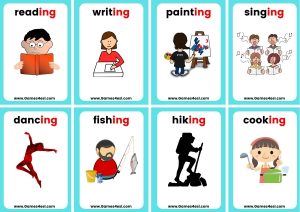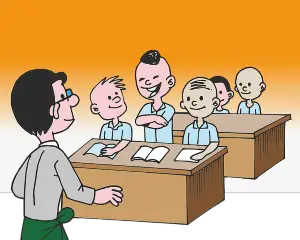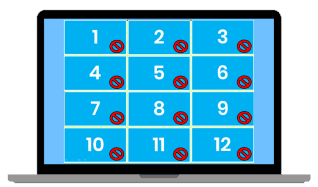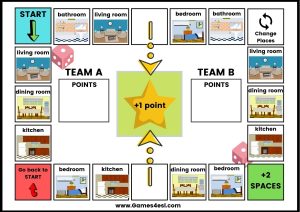Teaching vocabulary to preschoolers is not just about giving the definitions and some examples, but about creativity and fun techniques to practice the words with them. One of the best and practical ways to teach them vocabulary is using games. Here are some of them.
Categories
This game helps children to categorize the words in the columns, to get their meanings and to find a relationship between these words. For each category, you can use flashcards (fruit, vegetables, clothes, sports, etc) and give a list of different words to your kids (banana, skirt, apple, tomato, tennis, baseball, shirt, shorts, kiwi, etc.).

out the odd word
This game is a bit similar to the previous one because it is again related to categorizing. Here the teacher gives a list of words, asking kids to cross out one odd word from each line. For example:
- November, July, September, October
- Cold, snow, January, summer
- Monkey, banana, apple, kiwi
- Run, tennis, baseball, football
- Taxi, car, bus, house
How many?
Here all you need is to show a picture of different things (animals, fruit, vegetables) and to ask your younger learners to count how many things there are in the picture.
2-litre jar
This is a fun game to play with your kids. You show them a 2-litre jar and ask to come up with words that can be placed in this jar. For example, they can say coffee, candle, but they cannot say happiness or animal, because they cannot be placed in this jar.
I spy
One might call this game an old one, but my younger learners adore it. To begin the game choose an object and give some hints to your kids, such as: “I spy something that is big and blue”. The pupil that guesses the word takes a turn to spy something and let other kids guess.
Apple Pass
Get your kids to sit in a circle. You can use a real apple or a fake one. While you pass the apple to the next student, you must say one English word. The student then throws to another student and says a different English word. The student who fails to catch the apple or to say a word is out. And the game continues until you have one winner. It can be played with different categories, such as fruit, vegetables, animals, etc.
Touch
This game is all about giving some instructions. The teacher says: “Touch the board”, “Touch the chair”, “Touch something black”, etc. And young learners go around the classroom to find the appropriate objects and to touch them.
Basketball
Make a paper ball and prepare a box where your kids can throw an imaginary ball. Show a flashcard to the first student. If they say the right word and throw the ball into the box, they get two points. But if they fail to do one of these things, they get just one point. The person who gets the most points is the winner.
Pictionary
This is a nice activity for recycling vocabulary. You can play this game in groups. Tell one of the students a word and ask him/her to draw a picture of it on the board. The first student to guess, what the picture is, gets a point and takes a turn to come up to the board and to draw the next picture.
Line True or False
Put a line of tape on the floor and make appropriate signs for «True» and «False». Show a flashcard and say its word (you can say a wrong word). If students think that you have said the correct word they jump on to the True side, if not they jump on to the False side. The student who gives the wrong answer is out.
What games do you play with your preschoolers?

Image: Shutterstock
One of the most effective ways for young children to gain knowledge and develop crucial abilities is through play. So, if you’re in search of some fun and educational activities to do at home, word games for kids are the perfect option to keep your little one engaged. This game also makes learning at home enjoyable and lays the foundation for successful school learning. Moreover, word games assist your kid improve their vocabulary, spelling, grammar, writing, reading, verbal, and communication skills. Parents can study alongside their kids as children like having their parents participate in their learning. In this post, we present you with a list of fantastic word games that kids and adults may enjoy together. Read on.
Benefits Of Word Games
If you are wondering why word games for children are beneficial, here are some reasons:
- Develops vocabulary
- Improves fluency in the language
- Hones comprehension and reasoning skills
- Develops a love of words and reading
- Sparks their imagination and memory
- Improves their problem-solving skills
- Encourages creativity
- Serves as a great pastime for the family
- Stimulates the brain
- Improves concentration
There are many word games for kids that help them learn new words. These games are entertaining and educational, making them enjoyable for everyone involved.
We have listed the 20 best word games for kids. These games will ensure you and your children have a great time learning new words.
1. Hangman

Image: Shutterstock
Hangman is a fun paper and pencil guessing word game for kids that can be played between two players. More players can participate and take turns as well. It is a simple game where a stickman is hanged if a player fails to get the word right.
Age group: 6 to 10 years
No of players: 2
How to play:
- Take a sheet of paper and a pen and draw gallows.
- The first player thinks of a word and draws dashes above the gallows equal to the number of letters in the word.
- The other player starts guessing the letters one by one.
- If the letter the player says is in the word, the first player writes it in the corresponding spaces on the dashes.
- If the letter is not in the word, the first player draws one part of the stickman, starting from the head and followed by the body, hands, and legs.
- If the stickman gets completed before the second player guesses the word, that player loses.
- Switch sides and start again.
- Proper nouns or slang words are not allowed.
2. Name the animal
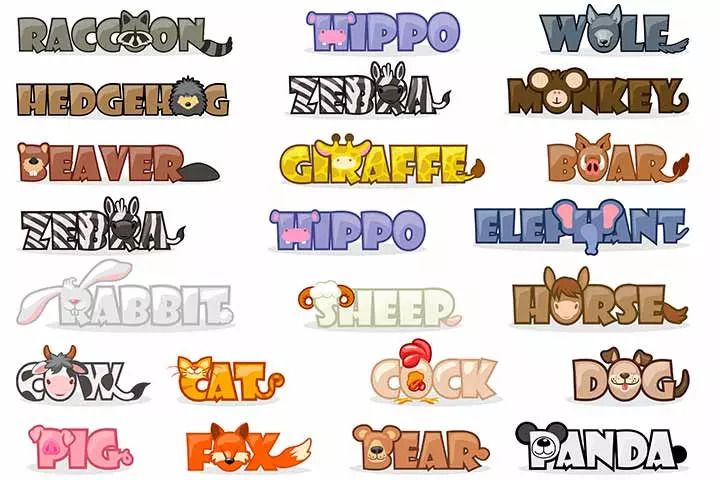
Image: Shutterstock
Name the animal is a multiplayer kids word game that can help teach your children animal names and improve their reasoning skills. This game also offers your child the opportunity to exercise their lateral thinking skills.
Age group: 4 to 7 years
No of players: 2 or more
How to play:
- You can be the host of the game.
- Make a list of common animals and a list of words that rhyme with these animal names.
- Call out each player and present them a rhyming word, and let them guess the animal name. You can say things like, “I rhyme with fog. I am a …..”
- The player who gets the maximum words correct is the winner.
- You can also teach them animal sounds by substituting animal names with their sounds.
3. I spy

Image: Shutterstock
I spy is one of the easiest games of the lot. All you need is your imagination and some eager players.
Age group: 4 to 6 years
No of players: 2 or more
How to play:
- Locate an object, and tell your child its first letter saying, “I Spy an object starting with the letter ….”
- Your child looks around and recognizes each object corresponding to that letter.
- Stop when they get it right and continue the game with the next player.
- You can also mention the color or shape of the object and let your child guess it correctly.
4. Make a word
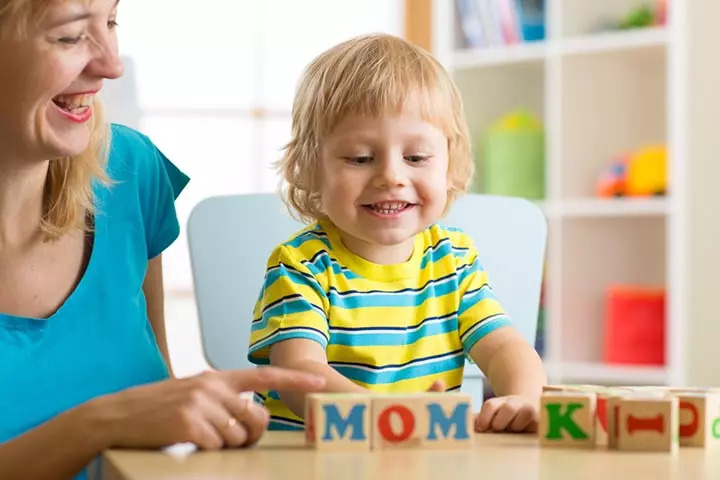
Image: Shutterstock
If your child is starting to learn new words, this word game for kids is useful. You can also play this game with older kids to make them learn difficult words and improve their memory. This game lays a solid foundation for playing advanced spelling games, such as Scrabble.
Age group: 4 to 12 years
No of players: 2 or more
How to play:
- You can play this game with younger children if you have magnetic letters, plastic letters, letter mats, or letter blocks.
- Give them a set of letters and ask them to make two- or three-letter words with them.
- For older children, you can play the game mentally or write a set of letters on a piece of paper and ask them to make as many words as they can from them.
- You can even play a timed version of the game with older children as they enjoy a good challenge.
5. Rhyming words

Image: Shutterstock
Rhyming Words game is a variation of Name the Animal. This word game for kids encourages your child to learn new words and helps hone their reasoning skills.
Age group: For ages 3 to 6 years
No of players: 2 or more
How to play:
- Name any animal.
- Ask your children to say the words that rhyme with the name of the animal, in turns.
- For example, when you say the word “dog,”your children should come up with words such as fog, hog, and log.
- Continue with a player until they run out of words and repeat the game with the next player.
6. Name, place, animal, thing

Image: IStock
You might remember playing this game as a child yourself. This game helps in expanding your child’s knowledge and memory.
Age group: 5 years and above
No of players: 2 or more
How to play:
- Give each player a sheet of paper and a pencil.
- Say a letter of the alphabet and start a timer.
- Each player must write the words of a name, place, animal, or a thing starting with that letter. For example, if the letter is A, a player may write, “Alex, Australia, Ape, Apple,” under each of these categories, respectively.
- You can assign different letters to different players or the same letter to each one.
- You can include other categories as per your convenience.
7. Hink pink
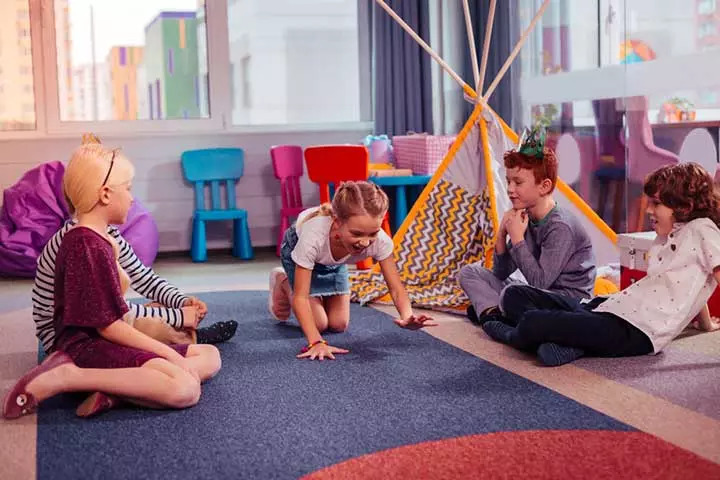
Image: Shutterstock
Children love this game. This word game for kids is designed to maximize fun while learning new words and their meanings. The game can help improve your child’s ability to solve crossword puzzles and cryptic crosswords.
Age group: 4 to 12 years
No of players: 2 or more
How to play:
- Ask each player to come up with a set of rhyming monosyllabic words, e.g., fat rat.
- Help them make a clue about their words. In this case, the clue will be “a rodent that is not thin.”
- Each player says their clue aloud, and the others try to guess what the rhyming words are.
- If the children are older, you can play Hinky Pinky (two-syllable words) or Hinketty Pinketty (three-syllable words). You can even make different combinations between different syllabic words.
- Ask the children to act out the words too so that all of you have lots of fun while the children learn difficult words.
- Here are some more words to get you started: Thin Pin, Big Pig, Tan Pan, Fan Man.
8. Guess the correct word
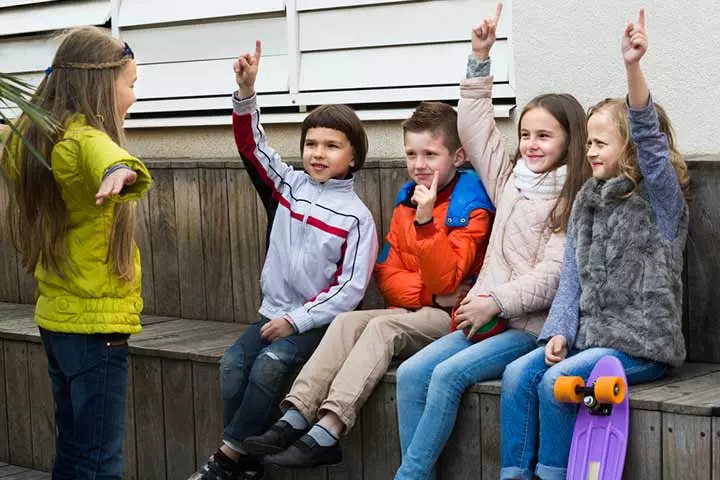
Image: Shutterstock
This word game for kids, if played mentally, is an excellent way to boost your child’s memory. It is a simple game and can be played with pencil and paper if you want to keep score.
Age group: 6 years and above
No of players: 2 or more
How to play:
- The first player thinks of a word and announces its first letter and the number of letters in the word to the others. If the player has thought of the word “Bananas,” they should say B and 6.
- The other players have to guess the word using these clues.
- If a player says another word but it has some matching words with the original word, the first player will say that the word is wrong but there are matching letters in the correct places or the wrong places.
- The next player uses these clues to make the next guess.
- You can keep the words simple or difficult according to the age of the children.
- As for the example of Bananas:
Player 2: Bullock
Player 1: That is incorrect
Player 3: Bahamas
Player 1: That is incorrect, but the As are in the correct place,
and so on.
9. Word hunting
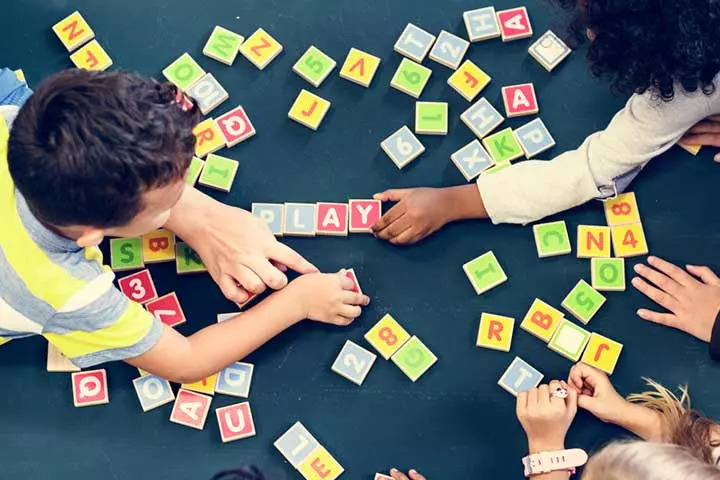
Image: Shutterstock
If your child is just learning the alphabet, this is an easy game to play. However, you can make some minor changes and tweak it for older children.
Age group: 4 to 7 years
No of players: 2 or more
How to play:
- Scatter magnetic letters, plastic letters, or letter blocks on a table.
- Ask your child to pick up a letter from the lot.
- For older children, you can write three- or four-letter words on little chits of paper and do the same procedure as above.
- For children who can read, you can ask them to pick words they see outside shops, etc.
10. Change one letter
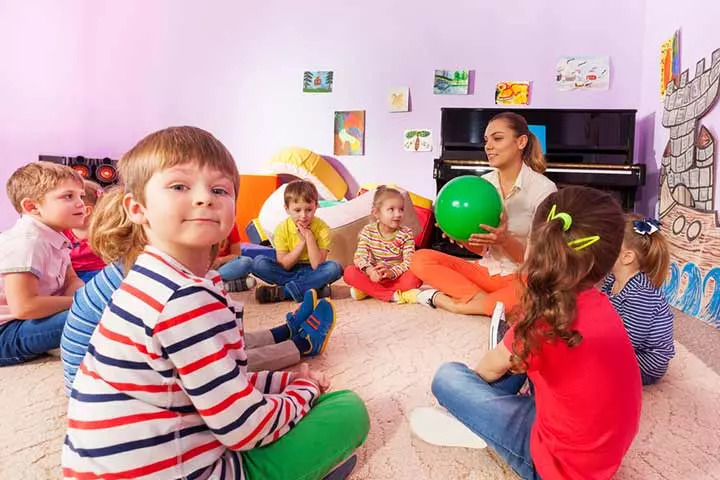
Image: Shutterstock
This is a great word game for school children. The game promotes out-of-the-box thinking and allows your child to come up with new words and even their meanings.
Age group: 5 to 10 years
No of players: 4 or more
How to play:
- Begin with a short word that has three, four, or five letters (according to the age of the children).
- Ask the children to take turns in calling out new words by changing just one letter of the previous word. E.g., park – part – dart – dark / mark – mare – mart / cart – care – case – cast – mast (and so on).
- You can set a timer or divide the players into teams to make the game more exciting.
11. Call my bluff
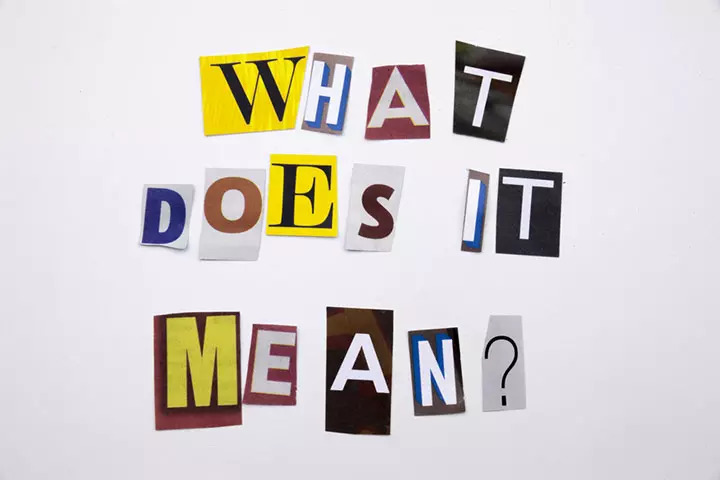
Image: Shutterstock
Call my bluff is commonly played at sleepovers and during picnics and is an excellent word game for older children.
Age group: 8 years and above
No of players: 4 or more
How to play:
- Divide the children into teams.
- Give them a set of words that are common but unfamiliar to them.
- Ask each team to look up the meaning of each word, and make up two wrong meanings for each word.
- Each team asks the other team the meaning of a word and gives them the three options.
- If the opposite team guesses the correct meaning, they get points. If they don’t, the team that asked the meaning gets the point.
- For example, let us take the word “Bewildered.” You can give three choices (a) to be left in the wild, (b) shocked or surprised, and (c) out-of-control behavior.
12. Unscramble the words
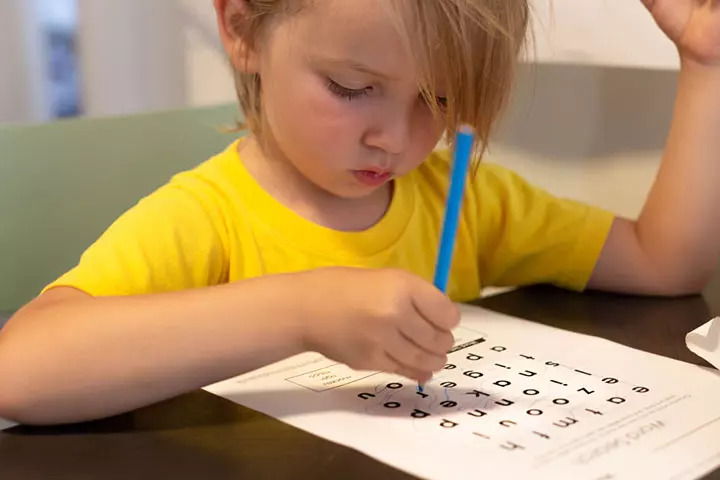
Image: Shutterstock
Let your children put on their thinking caps and play this game. The word game makes your child think and helps stir their imagination and improve their reasoning skills.
Age group: 5 years and above
No of players: 2 or more
How to play:
- Think of a word and write it down on paper but in a scrambled form.
- Your child has to think and arrange the word in the right sequence.
- You could even give clues so that they can unscramble the word faster.
- You could also write down a set of scrambled words, set the timer, and ask them to solve as many as they can within the allotted time.
13. Tell me a story

Image: Shutterstock
Children are incredibly imaginative. Children, as young as three years old, start making imaginary stories. You can play this game to fire your child’s imagination.
Age group: 5 years and above
No of players: 2 or more
How to play:
- Start a “story” with a sentence.
- The next player should say another sentence and continue the story.
- As the story grows, it becomes hilarious and absurd.
- For example, you start with the sentence, “In a village, there was a man named Joe.” The next player can say, “He wore a red shirt every day,” and the next player may say, “One day, a bull charged at him,” and so on.
14. Words in a word
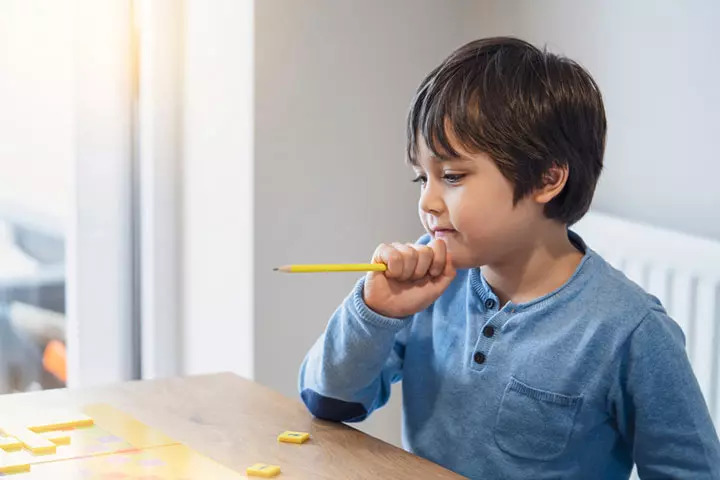
Image: Shutterstock
This is one of the most popular word games for kids and one of the best word-building games of all time. It is useful in improving your child’s English, if it is not your native language. You might have played this game in your childhood. It is now your children’s turn to play the game and keep the tradition alive.
Age group: 5 years and above
No of players: 2 or more
How to play:
- Think of a long word. A popular word choice for this game is “Constantinople.”
- Ask your child to write words starting with each letter in the word. They should use the letters contained in the word only.
- For example, Constantinople can have words such as con, cot, on, oil, no, nap, sit, and sip.
- You can set a timer and ask your child to write down as many words as they can within the given time frame.
15. I’m going on a picnic
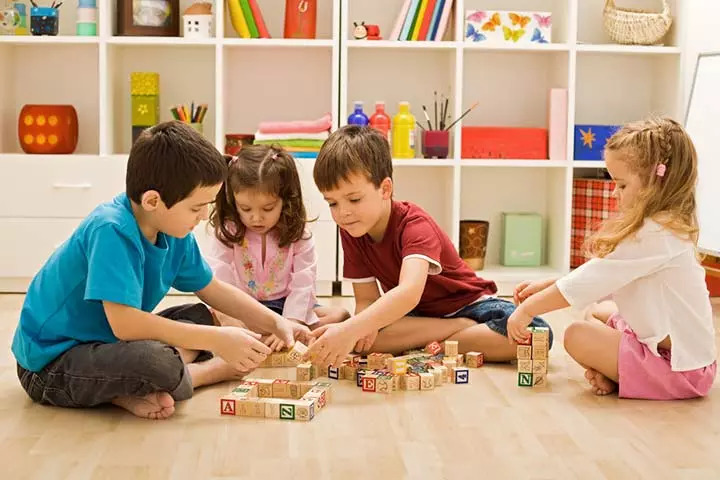
Image: Shutterstock
This game is for older children. It helps hone their creative skills and improves their memory. The word game is usually played in classrooms, but they can play it at a sleepover or even with you as a family game.
Age group: 5 years and above
No of players: 3 or more
How to play:
- The first player starts by saying, “I’m going on a picnic, and I will bring a ….”.
- The next player adds an item to the list and repeats the words.
- Each player has to repeat the items named in the exact sequence.
- If a player forgets a name or the sequence, they are out of the game.
- You can either start the game all over again or ask the next player to pick up the sequence and continue.
- For example, the game goes as follows:
Player 1: I’m going on a picnic, and I will bring a cookie.
Player 2: I’m going on a picnic, and I will bring a cookie and a Popsicle.
Player 3: I’m going on a picnic, and I will bring a cookie and a Popsicle and a bottle of juice, and so on.
16. Crosswords
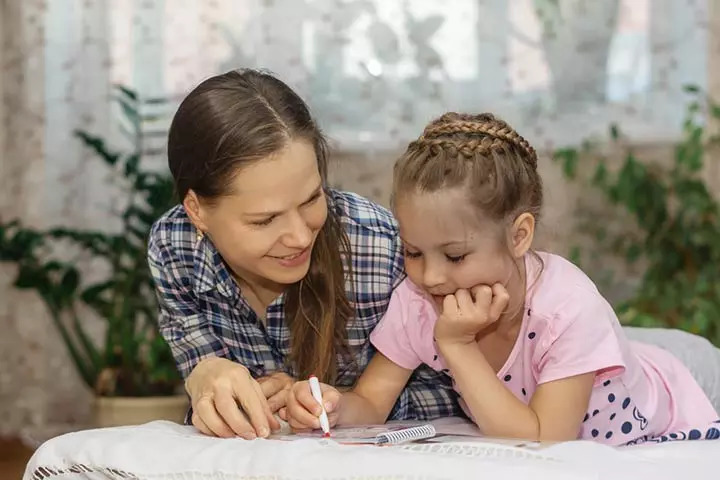
Image: Shutterstock
Solving crosswords requires practice and a lot of patience. The game will not only teach your children new words but also develop their deductive reasoning skills to a great degree.
Age group: 6 years and above
No of players: 1
How to play:
- Draw a grid with white and black squares and number each row and column.
- Then, write a set of clues at the bottom of the grid with the corresponding row or column number.
- Ask your child to solve the crossword.
- You can set a timer to make the game challenging.
- You can get some printable crosswords with clues easily on the Internet (you will find some free and printable crosswords in this link). Crosswords regularly appear in newspapers and magazines.
17. Word quest
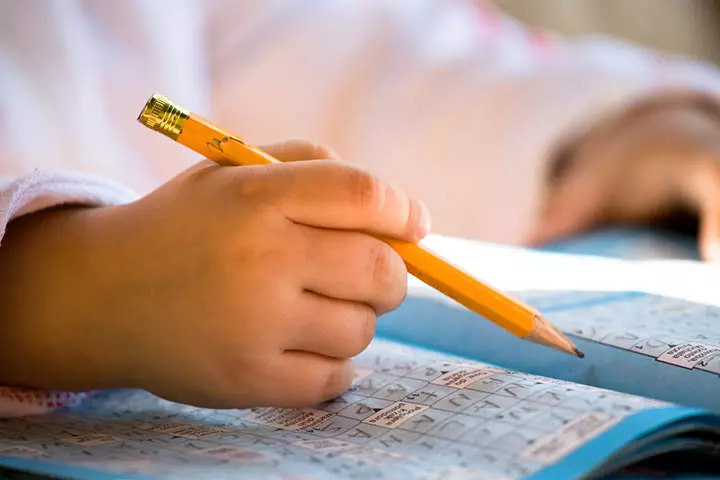
Image: IStock
Word quest is a word game for older kids. The game involves searching for words using single letters and makes your children use their deduction skills.
Age group: 5 years and above
No of players: 2 or more
How to play:
- Draw a 10×10 or 12×12 grid on a sheet of paper and divide it into squares.
- Write various words below and to the side of the grid.
- Write random letters in random squares.
- Ask your child to fill in the grid using the words you have written outside the grid.
18. Consequences

Image: Shutterstock
This word game helps stir the imagination and encourages creativity. The game works well with both children and adults.
Age group: 5 years and above
No of players: 2 or more
How to play:
- The first player writes down a sentence on a sheet of paper and passes it on to the next player.
- The next player writes the next sentence and passes it on.
- Once all the players are done with adding their sentences, you can read out the story.
- You can also write 4–5 sentences with open endings on a sheet of paper and hand them over to each player. Each player writes their version of the story and reads it aloud at the end of the game.
- For example, you can write, “There was a man named …….. He …………. a woman named ……………. They went to …………. He said, “…………………” She said, “……………………” And then, ……………..” and so on.
19. Scrabble
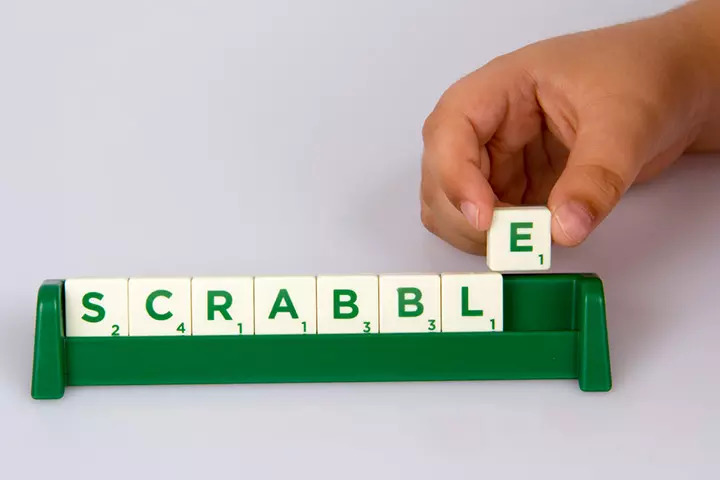
Image: IStock
Scrabble is a popular classic word game for kids. If you want your child to learn new words, this is one of the best games.
Age group: 6 years and above
No of players: 2 or more
How to play:
- Get a scrabble boards.
- Set it up and read the rules.
- The number on each letter tile tells you how many points it’s worth, and the squares on the board tell you how many points you scored.
- The player who gets the maximum score is the winner.
- After a game of Scrabble gets over, the board looks similar to a crossword.
20. Pass the bomb
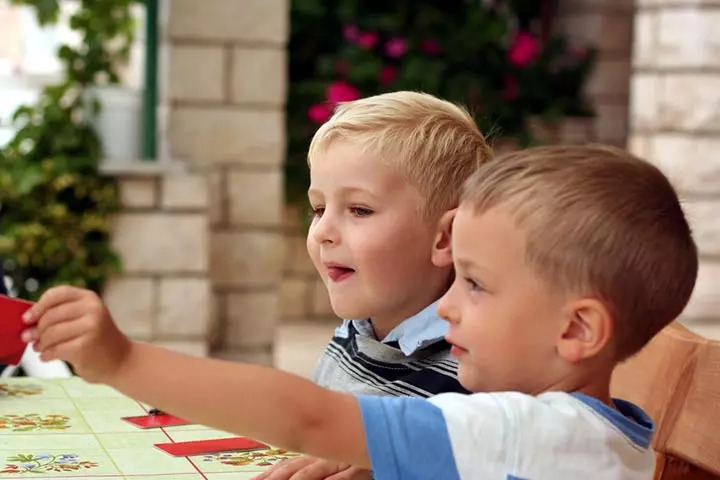
Image: Shutterstock
Pass the bomb is an educational game that will test your child’s alacrity. The first player should say a word and pass the bomb as quickly as possible to the next player, who must say a similar-sounding word. The players need to be quick in passing the bomb before it explodes. You can get this board game at a shop or simply make your own set.
Age group: 5 years and above
No of players: 2 or more
How to play:
- Take a set of card papers and write two- and three-letter words on them with a marker.
- The first player picks up a card and passes it around.
- The “bomb” goes off after a certain time. If you have made the cards at home, you can use a timer or even play music.
- The moment the timer goes off (or the music stops), the player holding the card is out.
- However, before leaving, they have to say a word that contains the word written on the card.
- For example, if the card has “ART” written on it, the child who gets out can say a word with ART in it, such as part, mart, or cart.
1. How can word games help children improve their spelling skills?
When children engage in word games, they are required to focus on the spelling of various words, which helps them to learn and remember the correct spelling of those words.
2. In what ways can word games help children with their grammar?
Word games encourage children to think about language playfully and engagingly, making it easier to understand and remember grammar rules. Word games can also help expand children’s vocabulary, an essential component of good grammar. By learning new words and their meanings, children can improve their ability to express themselves clearly and accurately.
3. How can word games help children improve their vocabulary?
Word games are an excellent way to improve children’s vocabulary skills, as they help them learn new words and reinforce their understanding of familiar ones. Games such as Scrabble, Boggle, and crossword puzzles challenge children to think critically and creatively about words, requiring them to use problem-solving skills to develop new words and find hidden ones.
4. How can word games help children become better readers?
Word games can help children become better readers by improving their vocabulary, spelling, and comprehension skills. Such games require children to identify and create words, helping them to recognize new words and understand their meanings. This eventually improves their reading skills.
When education is imparted as activities and games, children tend to grasp it much faster and retain it longer. So, if you want your children to have great communication skills, fluent vocabulary, and fascinating imagination, involve them in word games for kids. Games, such as I spy, make a word, or hink pink, are effective in keeping children engaged and sharpening their grammar and vocabulary. Another good thing about these games is that you can be involved in playing too. So, choose a suitable word game according to your child’s age and have fun while playing.
Key Pointers
- Word games stimulate the brain to improve reasoning skills, vocabulary, and language skills.
- Spur creativity through games such as I spy, rhyming words, and hink pink.
- Test the memory with games such as guess the correct word and make a word.
Was this article helpful?
The following two tabs change content below.
- Reviewer
- Author

If you teach English to kids you probably know that young learners get bored easily. So, how do you get young learners interested in learning vocabulary? The best way is through fun and exciting ESL vocabulary games and activities. That’s why we put together this list of the best ESL vocabulary games to get your students excited about learning English.
For more classroom game ideas, check out our other post, 10 Fun Guessing Games for Young Learners.
1: Pass The Ball
This classic classroom game is incredibly fun and a great activity to get your students motivated and energized. It’s also a fun way to introduce or review vocabulary with students. All you need is a soft ball and some flashcards.
How To Play:
Students will pass the ball around the class and when the music stops, the student with the ball must answer a question from the teacher. For example, if you are teaching vocabulary to do with colors, the teacher might ask ‘What color is it?’.
Another way to play is, when the music stops, the student with the ball can ask the question and all the other students must answer. This way all students get to practice the vocabulary while playing the game.
2: Line Bingo
This ESL vocabulary game is a great alternative to regular bingo. Most textbooks these days come with small picture / word cards at that back that students can use for this game. If you don’t have these cards, visit our flashcard page where you can download and print these ‘student cards’ for free.
How To Play:
Give each student or pair of students one set of vocabulary cards. Ask them to place them in a horizontal line in any order they want. Once students have placed their cards in a line, the game can begin.
The teacher should say one of the words and if that word is on the left end or the right end of the line then students can turn that card over. If the card is in the middle of the line, students cannot turn it over.
For example, if you are teaching the present progressive / continuous tense you can ask students to shout out ‘What are you doing?’. Then the teacher can answer using one of the words on the card (e.g. ‘I am painting.’). Then students should look at their line of cards and check if ‘painting’ is on the left or right end of their line.
The first student / pair of students to turn over all their cards is the winner. To make this vocabulary game more fun, invite your students one by one to the front of the class to choose the next word.
3: Hot Seat
This simple no prep game is a great way to get students to utilize all their existing vocabulary while learning new words at the same time.
How To Play:
To play this game, you can divide the class into 2/3 teams or you can just play as a whole class. Choose one student to sit in the ‘Hot Seat’. This is a seat at the front of the class facing the other students.
Then from behind the student in the hot seat, show the other students a word from the lesson. The other students must try to describe what the word is without saying the actual word. And the student in the hot seat must guess.
Kids absolutely love this game and it is a great way to review vocabulary that your students have learned that lesson.
4: ‘1 2 3 Go!’ Game
For this vocabulary game you can use flashcards or you can simply write the words on the board.
How To Play:
Put the flashcards (or write the key words) on the board in a line. 6-8 words is the best. When the teacher says ‘ 1, 2, 3, Go!’ one student must jump up and shout the first word. Then another student must jump up and shout the second word. Then another student must jump up and shout the third word. And so on until all 6/8 words have been called out.
Any student can jump up and say any word at any time, but if 2 students jump up at the same time, then they lose.
This game can be played as a whole class, or if you have a large class, divide the class into teams.
5: Matching Games
These PowerPoint Games will test your students’ memories. Matching games are simple to make and great for reviewing vocabulary.
How To Play:
Divide the class into 2 teams. The aim of the game is to find two matching words / pictures. The teams will take turns choosing TWO numbers. Click on the square to reveal the word beneath. If the two words are the same, then that team gets a point. If they are different then click on red circle to hide the word again.
The game becomes more and more fun as it progresses because students start to remember where they saw the words. Download ready to use matching games and a blank template here.
6: The 4 Corner Game
This no prep classroom game is great to review vocabulary and as a listening activity.
How To Play:
Assign a word to the 4 corners of the classroom. Then, choose one student to come to the front and close their eyes. Then the other students have 5 seconds to move to one of the corners of the classroom. After the time is up, the student at the front will choose one of the words while keeping his/her eyes closed. The students standing in the corner with assigned with that word are out, and must sit down.
The game continues like this until one student is left. That student is the winner, and can be the next student to come to the front and close their eyes.
TIP: Many students moving around the class can be quite dangerous. For safety, instruct students not to run and make sure there are no bags, coats, books, etc, on the floor that the student can trip on.
7: Printable Board Games
Printable board games are easy to prepare and a great way to get kids talking using the vocabulary from that lesson. Download many printable board games and board game templates, and find detailed instructions on how to play them, here.
8: Hangman
If you’re not familiar with hangman, its a game where the teacher would think of a word and then draw a line for each letter of that word. Then students must try to guess what the word is by guessing letters of the alphabet.
In the traditional hangman game, if students guess wrong too many times, then the teacher would draw a man hanging from his neck on the board. Even though it is just a stick figure drawing, the idea seems quite gruesome and maybe not appropriate for children. That is why we made a fun alternative to hangman, ‘Save The Teacher’.
How To Play:
Think of a word and draw lines on the board corresponding to the letters in that word. Then ask students to guess letters of the alphabet to try to guess what the word is.
If students guess wrong, play the video and the fuse will get closer to the rocket. Pause when you see the pause sign and ask students to guess again. If students guess wrong too many times, then the rocket and the teacher will blast off into space.
Don’t worry, at the end of the video the teacher is okay and just went for a fun ride.
9: Hidden Picture Games
These PowerPoint games are easy to make and a great way to introduce or review vocabulary. Download ready made hidden picture games and an editable template here.
How To Play:
Click on the color shapes to make them disappear. As the shapes disappear the picture beneath is slowly revealed. When students are ready to guess what it is, they should raise their hand and guess while using the target language.
For example, if you are teaching vocabulary about animals, when the student guesses they should say ‘Is it an (elephant)?.
10: Whisper Game
This is a very fun classroom game and all you need is a board and chalk / a pen.
How To Play:
Write many words from the lesson on the board (at least 10). Then divide the class into two teams and ask them to make two lines in front of the board. Give the student at the front of each line a board eraser.
Next, the teacher should whisper one of the words to the students at the back of the lines. Then those students should quickly whisper the word to the next student in line, and then that student should whisper to the next student, and so on down the line.
When the word is whispered to the student at the front of the line, he/she should quickly run to the board and erase that word. The quickest one to erase that word wins a point for their team. Then change the student at the front and play again.
Running out of tricks? Here are some quick vocabulary games for kids that every ESL/EFL teacher can rely on anytime of the day. They require little to no preparation and some can be given to kids and adult learners by adjusting the level of difficulty.
Ready to get your class off to a good start? Read on!
Vocabulary Games for Kids
1. Anagrams
The teacher writes preferably an 8-letter word or longer on the board and students make as many new words as they can using all the original letters from the given word exactly once. The team that produces the most number of words after the time runs out wins the game.
Variation: When checking the answers, cross out common words that appear in at least two of the teams. The team with most number of unique words wins the game. You may also vary the point scale with higher point goes to difficult or longer words.
2. Jumbled Word
The teacher writes a scrambled word on the board that students need to un-jumble in their teams, e.g LEJMUB –> JUMBLE. The first team that guesses and spells the word correctly gets the points.
Variation: For more advanced students, you may give 3 or more jumbled words at once which they need to solve in 1 minute. Points earned per correct answer. You may also try giving scrambled sentence which will test both vocabulary and grammar.
ALSO READ: SPEAKING ACTIVITIES FOR ANY LANGUAGE CLASS
3. Message Relay
The participants are divided into groups and each group forms a line. The person in front will be given a message and must pass it correctly to the next person by whispering until the student in front of the line writes it down. The goal is to get the message relayed to the last person intact and without any changes. If the sentence is perfect they get a point.
4. Back Spell
A kind of relay game where teams of equal size sit down in a neat line. The first student of each row should have a board and marker (but a pen and paper will do). Teacher gives a word to the last students at the end of each line. They need to pass the word along by drawing the word, letter by letter onto the back of the person in front of them until it reaches the first person at the front of the line who need to write the word on their board or paper. The first team to spell the word correctly wins the game.
Variation: You may give different words with the same amount of letters to the last student of each row to prevent cheating. You might also want to teach them some actions or signs before playing the game such as tapping or shaking their head to signify “repeat the drawing”.
5. Simple Simon Says
One of the classic vocabulary games for kids for teaching imperatives, parts of the body or simply as a classroom management. The teacher gives a command by saying “Simon says ___” and students obey, e.g “Simon says… put your hands on your head.” Players are eliminated from the game by following a command that is not immediately preceded by the phrase “Simon says”, or by failing to follow an instruction which does include the phrase.
Variation: You may ask one of the students to act as “Simon” and give commands to the whole class. The object for the player acting as Simon is to get all the other players out as quickly as possible; the winner of the game is usually the last player who has successfully followed all of the given commands.
6. Hangman
The teacher draws a row of dashes on the board representing each letter of the word that he wants the students to guess. If the guessing player suggests a letter which occurs in the word, the teacher writes it in all its correct positions. If the suggested letter or number does not occur in the word, the teacher draws one element of a hanged man stick figure as a tally mark.
Variation: Split the class into two teams to compete against each other and associate each team with a different marker color, e.g black v blue. Play hangman regularly except now each team gets one guess per round. When the class solves the mystery word, the point goes to the team that guesses more letters. You may also give each team points equal to the number of letters they have guessed.
7. Rock, Paper, Scissors!
Form two teams with equal number students who will line up and compete against each other. The first person from each line will meet at the center and play Rock, Paper, Scissors. The winner can ask the other player to give a word from a category or to answer trick questions. If the player answers incorrectly, they are out and the first team to get all the players from the other team out is the winner.
8. Pass the Ball
Students make a big circle and pass a ball in one direction (clockwise or the other way around) while the teacher is playing a music. The student who is holding the ball when the music is paused will give a word from a given category, i.e. countries, animals, verbs, etc. If the player repeats a word that has already been said or fails to give a word after 5 seconds, he is out of the game. My students love this game specially when I play an upbeat pop song that they know!
Variation: Without the music, start by tossing the ball at a student who will give a word related to the category. He/she will then throw the ball to another student.
9. Linking Words
This is a word association game where the teacher gives 2 words (example: “house and soda”) and students have to link the words by inserting other related/relevant words in between, i.e “house – kitchen – refirgerator – soda”. You may decide the number of words the player can use to link.
10. Guessing Games
Divide the class into two or three teams and in turns, ask one student from each team to come to the front. The student picks a word and conveys the word to his team. This game can be done using actions (charades) or drawings (pictionary) where student pantomimes or draws the word, respectively. I usually tell my students to choose whichever they feel more comfortable using to convey their ideas across. The team must guess the word correctly before the time runs out. If not, other teams may have the chance to “steal” and gets the points if their answer is correct.
FREE DOWNLOAD: ESL VOCABULARY ACTIVITIES POWERPOINT
11. Slap the Board
This game works best with beginner students. The teacher writes words arranged randomly on the board and calls one player from each team to stand equidistantly from the board. The teacher will say one of the words and students should run up to the board and slaps the word when they find it.
Variation: A variant of this game is called “Swat It!” where students use fly swatters to swat the word instead of slapping the board.
12. Word Association
In this game, students may stay in their seats or make a circle. The aim is to say a word that are associated together. Start by saying a word related to your lesson or topic. The first student will say aloud any word that they associate with your given word. The next player will then do the same with the previous word, and so on, i.e “tomato –> red –> Mars…” The student who gives an unrelated/dissociated word is out. Make the game more challenging by making the exchanges fast (maybe only 5 seconds to think?!).
13. Bingo
The teacher gives students a list of 20 words, phrases or sentences and ask them to copy 7 words they want on their notebook. The teacher then gives the definition of a random word from the list but does not say the word itself. If students think they have the word the teacher defines, they tick it. The student who ticks all 7 words they had chosen shouts BINGO and wins the game.
14. Rhyme Charades
This is a good way to teach students rhyming words. The teacher gives and example by saying, “I’m thinking of a word that rhymes with ‘Light’” Teacher then calls a student who thinks he knows the answer. But instead of saying the word, the student goes to the front and pantomime his guess. (For example, the student might act like he is becoming taller if he is thinking of the word ‘Height’). The rest of the class will then guess what the student is miming. If one of the students mentions the correct answer even if it isn’t what the actor is doing, it won’t be counted as a correct guess.
To get the students involved, I usually split the class into two teams. I give each team a whiteboard where they can write their chosen word to prevent them from changing it once the other team has correctly mimed the answer.
15. What’s on the List
I don’t know what to call this game so I’m just calling it this way. Divide the class into two teams and give each team a mini-whiteboard or a paper. Let the team leaders pick a topic written on strips of paper. Give them 2-4 minutes (depending on their level) to shortlist 12 items related to the topic they’ve got. When the time is over, tell whoever goes first the topic of the other team. They have 30 seconds to guess what’s on the list and will get a point for each item they guess correctly. Play as many rounds as you want with different topics. The team with the highest points wins the game!
16. Human Tic-Tac-Toe
This is a usual tic-tac-toe game, but with a twist! First, divide the class in two teams, X and O. Arrange 9 chairs in three rows and three columns or draw the grid on the floor using a chalk or dry erase marker. Now start asking questions from your lesson or topic. The group that gets the answer correctly gets to sit on the chair or take a spot on the grid. When using the latter, I tell the Xs to sit down and the Os to stand up to avoid confusion. Whichever group forms 3 first, either diagonally, horizontally or vertically, wins the game.
17. Dice Game
Choose 6 categories and assign 1 category to each number on the dice. Give each group a die. Students take turns rolling the dice and give words under each corresponding category.
18. Oral Spelling
Teacher has a list of new vocab words handy. Groups of students form single-file lines. Teacher says a vocabulary word. Each student down the line says 1 letter until the word is spelled. If a mistake is made, spelling starts over with the next person in line.
Are you on Pinterest? Pin this post!

Do you use other quick, no-prep ESL vocabulary games for kids? Let us know in the comments and we will add them here!
[facebook_comment url="http://www.goviajero.com/ no-prep-esl-vocabulary-games-for-young-learners" width="100%" number="20" color="light"]A list of fun English word games for kids to help improve children’s spelling, reading, and vocabulary. This list of word games for kids includes word games that encourage conversation and early literacy that you can play on the spot or prepare yourself with just some paper and pencil.
Why are Word Games Good For Kids?
Word games and vocabulary games for kids are great because they get kids talking and using language while having fun. When you make a learning activity fun, kids don’t realise they are learning.
For reluctant learners, playing these word games can help and motivate them to want to play and learn more.
*This post may contain affiliate links, read more here.
10 Fun Word Games for Kids
Many of these word games for kids can be prepared easily at home with materials you already have. However if you don’t have time to prepare your own, you can also purchase a range of fun word games for kids HERE.
1. Hang Man

Probably one of the most popular word games for kids is the popular Hang Man. Player 1 thinks of a word and Player 2 has to guess it before they get “hung.”
Player 1 writes spaces for letters are written on the page so they know how many letters there are in the word. Player 2 proceeds to choose a letter they think may be in the word.
If it is correct Player 1 writes the letter down where it goes. If it is incorrect Player 1 draws part of the “hangman”. If the drawing is complete by the time Player 2 guesses, then Player 1 wins.
2. I spy
A really easy and fun word game for kids is I spy. You don’t need anything for this game except your imagination.
Player 1 thinks of a word and tells the others the first letter. “I spy with my little eye, something beginning with __” The other players need to guess the word. Whoever wins gets to be the spy!
This is a really great car game for kids too and helps to build vocabulary.
3. Bingo
Such an easy word game to prepare for kids. There are some really good versions on Amazon HERE. You can purchase the game, or use it as an example to make your own.
Draw a square grid on a page and choose a theme. Write out some words using the theme. Eg, beach: swimming, sand castles, water, sea shells, dolphin, sunbeds, picnic etc.
Make an extra copy of the words ensuring there are a few extra than the amount on the page. Cut them up into squares and put in a bowl scrunched up.
Take turns in pulling out a word and reading it out loud, then finding it on your page. The first person to find all of the words calls out Bingo and is the winner.
This fun word game for kids helps with reading and talking aloud.
4. Word Family Game
This game requires children to rhyme. Select one word and everyone needs to write as many words as they can that rhyme with that word. Eg. If the word is “Cat”, answers could be: hat, bat, rat, sat etc.
This is a great word game to help build kids vocabulary and help their language skills.
5. Word Search
Another fun but challenging word game for kids is a word search. Draw a grid of 10 x 10 squares and place as many words as you can within the grid. Words can go up, down, or diagonal, and letters can overlap to be used more than once.
Create a list on the side or bottom of the page of the words you have entered. Then once you cannot fit anymore words in, fill the blank boxes with random letters.
Kids will need to find the words as quick as possible. This can be a fun word game to do individually or as a team. For kids who like to compete, you can make identical grids and see who finishes first.
This word game encourages persistence and helps to improve their literacy skills.
6. Unscramble the words
A simple word game for children that will get them really thinking! Write a list of words down on paper but scramble the letter order while writing. Kids will need to look at the letters and try to work out what the word is and guess it.
This can be quite a competitive word game, but it helps to really get their mind ticking.
7. Scategories
While this is also an official board game, (which you can find online here) you can also make it yourself quite easily. Each player has a piece of paper and pencil.
Select 10-15 categories. These can be anything you like but remember they should be popular enough that you can guess something with most letters. Eg. Country, Movie, Body Part, Actor or Actress etc.
Once you have your categories it is time to choose a letter. Without a dice, the easiest way is to write the letters randomly on a piece of paper.
Then one person closes their eyes and points to a letter. When the letter has been chosen, players have 2 minutes to fill in the gaps with something in each category starting with that letter.
Winner is the one with the most filled in at the end, or the first to finish.
This is a really fun and competitive word game for kids that helps to improve their vocabulary, spelling, and conversation skills.
8. Words within a word
This word game requires kids to create their own words. Choose one really long word with at least 8-10 letters. The longer the better.
The aim of this word game is for kids to try to make a list of small words out of the letters of the long word. So for example the word COMPUTER includes: put, cot, term, core, mop, top, pet. Etc.
This is a really fun word game to help children’s spelling skills.
9. I am going on a picnic
A fun word game to help with your child’s memory and to get them talking.
One person starts and says “I am going on a picnic and I will bring some… fruit”
The next person says what the first person said, and adds something of their own. “I am going on a picnic and I will bring some fruit, and some sandwiches.
The next person says what the first, and second person said, and adds something of their own. “I am going on a picnic and I will bring some fruit, some sandwiches and some ice-cream.
You continue on and on and it gets more difficult to remember everything. We usually can get to at least seven or eight, and surprisingly my pre-schooler can often remember more than me!
This conversational game helps with memory, and also learning new vocabulary.
10. Story prompts
This word game involves making up a story by taking turns in saying sentences. One person starts the story, and says the first sentence. The second person continues the story with another sentence, and so on.
The stories can become very interesting as each person has different ideas. Bilingual flashcards are great for this or you can find a great version online HERE.
This conversation activity helps kid’s imagination, as well as building their vocabulary.
Other Fun Learning Resources for Kids?
If you love these English word games, check out these posts!
English Classroom Games – To play in class or at home
Knock Knock Jokes – To get the kids laughing
Best Board Games for Kids – Educational and fun
Top Book Sets for Kids – For all ages
Which English word games do you play with your kids?
These fun English word games for kids can be played with children of all ages and also with adults just by adapting certain aspects of the game to suit the age of the player.
This list of word games for kids will keep kids entertained for hours on end without feeling like they are actually learning.


Word games for kids are a great way for children to learn new vocabulary in a fun way. This list of word games includes a range of spelling games, and vocabulary games for kids that will get them talking and help their language development.

Word Games and Vocabulary Games for Kids
Word games are a fantastic way to get your kids learning when they don’t realise it. These types of games help to build vocabulary, learn to spell, and communication in general. They are also really fun and most of them can be played almost anywhere.
If you are looking for board games that you can buy, check out our board games for kids post. These word games below don’t need much preparation, but if you don’t have time to prepare your own, you can also purchase a range of fun word games for kids HERE.
1. Hang Man

The Game: Arguably one of the most popular word games for kids is Hang Man. This word game can be played with minimum 2 players and is perfect for kids to practice their spelling. Player 1 thinks of a word and Player 2 (or more) has to guess it before they get “hung.”
How to Play: Player 1 writes down a line for each letter of the word they have chosen, so that the other player/s know how many letters there are in the word. Player 2 needs to guess a letter they think may be in the word. If the letter is correct Player 1 writes the letter down on the line or lines. If it is incorrect Player 1 draws part of the “hangman”. If the drawing is complete by the time Player 2 guesses, then Player 1 wins.
2. Words within a word
The Game: This is a great word game for kids that requires them to create their own words out of one large word.
How to Play: Choose one really long word with at least 8-10 letters. The longer the word the better. Then set a timer for 1 minute and start. Each player needs to try to make a list of small words out of the letters of the long word. So, for example the word COMPUTER includes: put, cot, term, core, mop, top, pet. Etc. This is a really fun word game to help children’s spelling skills.
3. I spy
The Game: A really easy and fun word game for kids that doesn’t need any materials at all and can be played anywhere is I spy. Guess what the person “spies”. Play this guessing game with as many players as you want in the car, on a walk, or even at dinner.
How to Play: Player 1 looks around and chooses an object that he or she can see then proceeds to say, “I spy with my little eye, something beginning with __” The other players then need to guess what the word is. Whoever guesses the correct words is next up to spy. Great game to play in the car.
4. Unscramble the words
The Game: This is a simple word game for children that needs a little preparation, but will get them really thinking. Kids will need to unscramble the letters to solve the word.
How to play: Write down a list of words on a page, but scramble the letters so that they are not in order. Kids will need to look at the scrambled letters to try to form the word. For younger children, it can be simple 3-4 letter words, for older ones to make it more challenging try some 5-8 letter words. This is a great vocabulary game for kids of any age that will really test their problem solving skills.
5. Bingo

The Game: Bingo is such a fun and easy word game for kids. There are some really good versions on Amazon HERE. That you can buy, but you can also just make up your own. Kids must find the words on their bingo card and be the first to cross them all off.
How to Play: Draw a square grid on a page and choose a theme. Write out some words using the theme. It could be colours, shapes, animals, or even their sight words they are learning at school. For a group of players, make sure that all of them have slightly different words.
Make an extra copy of all of the words on every page then cut them up into squares and put in a bowl scrunched up. You and the kids can then take turns in pulling out a word and reading it out loud. Whoever has the word on their page covers it with a token). The first person to find all of the words calls out Bingo and is the winner.
6. I am going on a picnic
The Game: An old favourite, and a fun word game to help with your child’s memory and to get them talking. One person is going on a picnic and each person has to say what they are bringing along, but with a twist! The more you play this vocabulary game the better you get at it.
How to Play: This game can be played with 2 or more people. Player 1 starts with saying “I am going on a picnic and I will bring … (and chooses an item, eg sandwiches”
Player 2 then repeats what the first person said, and adds something of their own. So, for example “I am going on a picnic and I will bring some sandwiches, and some strawberries.
Player 3 (or back to player 1) then repeats what the first person said, then the second person, and adds something of their own. So for example “I am going on a picnic and I will bring sandwiches, strawberries, and a picnic rug.”
You keep going like this for each person around the circle and as you go, it gets more difficult to remember every item. The game ends when someone cannot remember them all.
7. Alphabet
The Game: Another simple vocabulary for kids to get them thinking is the Alphabet game where you go through the alphabet to name different subjects.
How to Play: Write down the letters A-Z on paper, and then choose a subject such as animals or places. Kids need to then go through the alphabet using each letter to write down something from that subject. For example, Ape, Bear, Cow, Duck, etc.
The person who has the most at the end is the winner. This word game can also be played out loud if you don’t have paper, taking turns with each player going through the alphabet until someone cannot continue.
8. Word Family Game
The Game: This fun vocabulary game requires children to rhyme and think of new words. It can be played with 2 players or even a group.
How to Play: Choose one word to start with, and then everyone needs to write as many words that rhyme with that word. For example if the word is “Mat”, answers could be: cat, sat, rat, pat etc. If you are playing in the car or on the go, you can do one word at a time. If you have paper, then start with a list of words and go through them all with a timer. The person with the most words wins.
9. Word Search

The Game: A fun but challenging word game for kids that encourages persistence is doing a word search. Kids need to find the hidden words within a grid.
How to Play: You can find lots of fun word searches online for free and print them out (as the one in the image above) Or you can make your own easily by drawing a grid of 10 x 10 squares. Once you have your grid, place as many words as you can within the grid. Words can go up, down, or diagonal. For older kids who need a challenge, make some letter overlap and used more than once.
Make sure to create a list on the side or bottom of the page of the words you have entered so the player knows which words to find. Once you cannot fit anymore words in, fill the blank boxes with a range of random letters.
10. Story prompts
The Game: This is a great vocabulary game to get kids talking and sparking their creativity by making up stories together.
How to Play: Kids need to take turns in saying sentences to make a story. Player 1 starts the story, and says the first sentence. Player 2 continues the story with another sentence. Player 3 (or back to Player 1) continues the story again with another sentence and so on. The stories can become very interesting as each person has different ideas.
Other Fun Learning Games for Kids
If you love these fun word games for kids then you may be interested in our other posts that are also educational and help kids with their vocabulary and communication.
- Best board games for kids
- Best car games for kids
- Best kids activities to do at home
- Fun and simple science experiments for kids
- Nursery rhyme lyrics
Best word games for kids of all ages
These word games will certainly encourage your kids to use new vocabulary and improve their spelling too.
The best thing about these word games for kids is that they can can be played with children of all ages. Even parents can join in the fun too. Just adapt the game to suit the age of the player. Let us know if you have a favourite word game for kids that we haven’t listed so we can try it out!
Follow Mum’s Little Explorers on Facebook for more inspiration and if you are in Melbourne, come join the Melbourne for Kids Facebook Group.
Word Search
Word Search is a fun vocabulary game that will test your student’s knowledge of English words. In this game you can play the 1 player version or 2 player version where teams battle to find the most words first before their time runs out.
Level: Young learners (A2), teens and Adults (A2 – B1)There are two modes – “Classic” which takes words from all the different categories or categories. This can be played in 1 player or 2 player modes. There are currently 9 different category of words (with more coming soon).
Custom mode allows the teacher to create their own size and category for students. This is a great way to make games easier or more challenging.
How to Play?
- Students can be put in teams or play against each other.
- Each student/team takes a turn to try and get a high score.
- The most words found is the winner.
More Vocabulary Activities like Word Search
Check out our other vocabulary activities for young learners, teens and adults!
ESL Say It! – A simple no prep warmer/cooler or quick break for students. In this activity students have to say a word from a category that begins with a letter.
ESL Wordle – based in the popular English word game but with 8 categories to make the game easier to be played by language learners
ESL Guess Who – Practice describing people with this fun online game.
MIXUP – A simple quick fire vocabulary game. How many words can you guess in 90 seconds?
Word Wheel – Get class started with this fun vocabulary challenge. In this game students try and guess what the nine letter word is while also making words using the letters and the key letter. The team with the most words and points will win!
Learn to tell the time – Practice reading the setting the time with this fun interactive game to practice telling the time.
ESL Scattergories! – A classic quick thinking vocabulary where students need to think of vocabulary quickly to get the most words beginning with a letter.
Scattagories for Kids! – Now play with young learner and lower level students in this simplified version of our classic game.
Name 5! – Name 5! is a simple no prep vocabulary warmer. In this activity students need to say a number of words based on a range of topics. Can your students beat the clock!
5 Seconds! – Students need to say 3 words from a random category in 5 seconds to score a point.
Guess the Word – A fun game to practice reading, spelling and vocabulary. Students read the definition and try and guess what the word is. Ideal for A2 level students. 11 categories of words to practice with.
2 Pictures 1 Compound – Can you guess the closed compounds nouns from the pictures? Practice guessing the compounds nouns with this fun interactive game.
Interactive Board Games – Practice speaking, grammar and vocabulary with these interactive online board games. New board games added regularly.
ESL Vocabulary Fortunes – An online game for teens and adults that is a great way to practice vocabulary on a large number of topics.
Animal Vocabulary Games – Practice animals with these four interactive online games. These fun games are a great way to revise animal vocabulary with your students.
Fruit and Vegetables – Practice vocabulary, spelling and pronunciation with this fun interactive word game.
Animals – Practice animal vocabulary, spelling and pronunciation with this fun interactive game.
Story Dice – Get your students making and telling stories with this fun online story tool.
ESL Countdown – Practice vocabulary and spelling with countdown.
Anagram Word Game – A simple word game. Suitable for teens and adults with an intermediate and above level of English.
Word Unscramble – Practice vocabulary and spelling with this unscramble game for young learners.
ESL Category Generator – Generate categories to get your students practicing vocabulary. Great activity to be used with a ball or in online classes to get students thinking at the start of class as a warmer.
Trivia Quiz Generator – Generate quizzes quickly with this simple tool. Ideal for teens and adults intermediate and above.
Random Letter Generator – Generate random letters from the alphabet with this simple letter generating tool.
ESL Idiom Generator – Generate over 100 of the most common English language idioms. Get students to draw or mime out the idioms as a way to introduce them to the most common idioms in English.
Random Noun Generator – Randomly generate over 200 of the most common nouns in the English Language. Great for Pictionary and other end of the class coolers.
Catchphrase – A quick fire word game where students explain as many words as they can within the time limit.
Pictionary – Automatically generate words from three different levels of difficulty and play Pictionary with your students in a flash.
ESL Boggle – Boggle is a great warmer that can be used in the classroom. With this online version get students writing words to be the top of the class.
ESL Quizzes – Our Quizzes are a great way to end class and practice key vocabulary for a wide range of themes. Check back regularly as we are adding new quizzes regularly.
Visit our YouTube channel for new games weekly
- Video
- Alphabet songs
- Flashcard games
- What is missing?
- Find something blue
- Guess the color
- Where is that?
- Can or can’t
- Feelings and emotions
- What time is it?
- Categories
- Who are you?
- Close your eyes and show…
- Describe a picture
- Charades
- Simon says
- Hot potato
- Quiz
- Emoji game
- Summary
When it comes to teaching kids, perfect knowledge of the language is not enough to become a good teacher. Grammar tenses and speaking exercises don’t make any sense if they are not accompanied by playing games. In comparison with teenagers or adults, young learners don’t have any logical reasons to attend your class but feelings. Children will love English if you show them how much fun there. It is crucial to be positive, easy-going, and patient when you teach kids. Don’t try to push them to do something because it’s a rule, make them interested in the learning process. It seems to be difficult, to come up with games for kids and create something entertaining all the time, but it is highly rewarding job.
Young students have no intention to win a game, they just want to have some fun during your lesson. That is why, it is so hard to make them focus on one thing for a long time. Whether you teach listening or vocabulary, it must be an active task.
Fortunately, children memorize everything easily and quickly, you just need some supplies to catch their attention. We would like to tell you the most interesting and effective ESL kindergarten ideas that you can implement right away.
Video
Alphabet songs
This is an obvious start of your course with kids, who can’t pronounce some letters and sounds in English correctly. Needless to say that rhythm helps to memorize words faster, however knowing all letters in English alphabet isn’t the objective of this activity. It is significant to know but not enough to improve reading or pronunciation. What is more important that children should differ some sounds, which start from the same letter. It helps them to start reading too. For example, we know that C might be different in some words, like crocodile and cinema.
There are plenty of songs you can find on YouTube. Write some simple words to each letter on a board and make students repeat after you. Then change the game rules. They have to recall some words, which start from the letter you show.
Flashcard games
Flashcards is a flexible and adaptive type of ESL classroom games suits almost all vocabulary topics. Firstly, you can teach new words showing cards one by one. But there is a way to make such an exercise more interesting. For example, if you teach animals, start telling a story about all characters of a farm or a forest, and make some pauses to let students fill them in with a particular animal.
If you want to revise animals, choose one card and show to kids. They must raise their hands to say some facts about the creature on the picture. Prepare some small gifts or stickers to encourage students to compete a bit. Give such prizes to those, who names right facts about an animal.
What is missing?
It is a good idea how to conduct a lesson about face features, parts of the body, or rooms. Prepare ESL flashcards relate to the topic you want to teach. Also, you can make such cards on your own selecting appropriate photos on the Internet. List them and say to students, they have only 10 seconds to memorize all things they see. Count backward loudly to hurry them up a bit. Then, ask them to close eyes or turn off screen sharing if you work online, and delete a card while they don’t see it. When the list of things appears again, there will be one missing card that kids must identify and name.
If you have on offline class, you can use toys or other tangible things instead of pictures.
Find something blue
As little students love to move, you can have a short useful break during a lesson. As soon as you teach colors, use all things in a classroom as a vocabulary game. When you say, «find something blue» or whatever color you name, all class must find the color and point it out. It might be a spot on a t-shirt, or a pen in someone’s pencil case, what is more important that students have to identify the color as soon as they can.
An online version of this game might be conducted through bright pictures. Prepare some colorful illustrations with small details or animals on it. So, students will be able to revise one more topic, because they have to pronounce what things they have found.
Guess the color
There is one more easy game to work on colors. However, in comparison with the previous one, it has an opposite objective. Instead of naming some colors, you show black and white pictures of things or animals that learners know. As soon as they recall what something looks like, they have to describe what colors there must be.
You can change the rules to train listening skills. Ask students to take their drawings from home. Then each participant should explain what they have drawn, whereas the rest of the class guesses what colors are in the drawing. It is more difficult, because the imagination of children runs wild and they can paint usual things like sky and field different colors.
Where is that?
Teaching grammar isn’t something detached in children’s course. It is integrated in all vocabulary topics to help young learners produce not only phrases but also sentences. They usually don’t care what prepositions mean, or how to use Present Simple, they just learn through conversational patterns and lexical approach.
That is why, you should think in advance, how to combine two similar topics to train all productive skills. For example, if you are going to teach rooms and things there, include prepositions of place in your lesson plan. Show a picture for 10 seconds, while class memorizes all things and their positions. After 10 seconds, hide the picture and ask each one to recall one thing and its location in the picture.
Can or can’t
There is a fun ESL game that doesn’t require preparation at all. It perfectly fits animal topic. In order to help students use grammar correctly and increase their vocabulary, implement it while you teach names of animals. Discuss and show if you can, what each creature can or can’t do.
Each kid thinks of an animal and explains what it can and can’t do instead of just naming it. Other classmates try to guess what it is. It is also a good chance to train Present Simple after that. Such an exercise help to get used to endings in English. For example children may say, «A rabbit can hop. It hops every day».
If you want to make the game more difficult, pronounce your examples keeping secrets what animals you mean. You may ask, «It can swim but can’t fly. What is it?»
Feelings and emotions
The most difficult thing in English for the majority of people is the verb «to be». Adolescents may understand the meaning of it, whereas children couldn’t care less. So, the best way for them to get used to it is repetition. In addition to this activity, you should stress all options of «to be» when you speak.
This game is supposed to teach kids how to talk about mood in English. Prepare some flashcards with peoples’ facial expressions and ask questions using basic adjectives.
Ask yes or no questions accompanied by a picture with some feelings. The learners have to answer either «Yes, I am» or «No, I’m not». For example, ask your class, «Are you tired?», while you show the picture where a person smiles. According to such a facial expression they will likely answer «No».
What time is it?
It is not a secret that some kindergarteners struggle to pronounce the time even in their mother tongue. However, we have a new version of such a trivial exercise. Firstly, make sure that young students know all numbers. Then draw some watches on cards and give a card to everybody. Choose the first host, who should stand in front of the class and write down the time, which their classmates pronounce.
For instance, the student says the time on their card, «Half past seven», whereas the host writes 7:30. You check and help if it’s necessary. Then, the turn of the next pair of learners, where one is a host, and another is a participant.
Categories
When little students have enough vocabulary to describe basic things like fruits, furniture, and animals, you may conduct a revision game. You need some baskets to prepare, the amount of those depend on the number of categories you want to have.
There might be following groups:
- food;
- jobs;
- colors;
- things at home;
- family.
Write down relevant words to each category on small pieces of paper and put them on a surface. Everybody should move quickly as possible to take a sticker and choose what category it fits. Then one by one, they run to a certain basket with that category and put the word in it.
Who are you?
Jobs is one of the basic topics. That’s a chance to have a role-play and an introduction game with little English learners. Write down all professions on stickers and give to everyone. Each kid should explain the job with some prompts, whereas others must guess it.
If it seems difficult, assign learners to think of only one fact. If the word is «chef», a child may say, «I cook food», or «I make dinner». Also, you can change the rules and explain different professions, where children have to listen to you carefully and answer correctly.
Close your eyes and show…
Parts of the body might be a piece of a fun game, if we add some physical work. Everyone must close eyes, while you as a host give instructions what to do.
For instance, «jump on your right leg» or «bend with your left knee». Keep in mind, you should observe everyone’s result and pay attention to those, who couldn’t figure it out quickly.
Also, you can use this game again in terms of imperative verbs. When you start teaching road signs or popular phrases, your students will recognize this grammar pattern. You may say, «count you fingers», and they will know what to do.
Describe a picture
It is better to show the meaning of the structures «there is» and «there are» on tangible and bright examples. Teaching ESL offline, go around the room and ask children to describe different places of the classroom.
When it comes to online teaching, you can find 3-5 pictures with furniture, food, or animals, in that case learners don’t have to move, they can do everything verbally. In order to challenge your class, ask questions to confuse students. If there are 7 dogs in the picture, you may ask, «Are there 3 cats in the picture?».
Charades
There is another ESL idea to make kids laugh. Learning new words might be boring for little students, so let them let their hair down and move a bit. The important rule in this game is to use only nouns. Choose a topic that you would like your class to work on, and give everybody a role to play. Explain that hosts can’t speak only show the word they have on a sticker. That’s a good way to recall some words, which students have learned recently, and finish a lesson.
Simon says
When we teach imperative verbs, it is also essential to drawn students’ attention to politeness. The ESL activity «Simon says» is an illustrative way to make a group get used to saying «please». You as a Simon should speak quickly and check kids’ reaction to your words. The point is to say random instructions, whereas class must do what you say only if they hear the word «please». It doesn’t take much time, however everyone will love such an active break.
Hot potato
Truth be told, this type of game is so convenient, because you can adapt it to a topic every time when you have no idea what to do with ESL kindergarten. Turn music on and warn students that when music stops, nobody will be able to pass a hot potato. Start passing it around the class adding some emotions to show that a potato is real, it makes students feel excitement too. A person, who holds a potato when music is mute, must do the task. It depends on the topic you have chosen.
You can assign:
- name 3 red vegetables;
- say 5 your favorite animals;
- how many pictures on the wall;
- what time is it.
Quiz
We know so many interactive activities for speaking and vocabulary practice, but what about listening? This ESL game takes some time on preparation, but the result is worth it. Make 10 questions to a topic you would like to have a revision on and draw them up on a colorful worksheet with bright illustrations. Encourage students to participate by some rewards and make a table to count everyone’s points in the end.
Ask questions and give options to answer helping if some team members hesitate. As your class already knows the topic, probably it won’t take much time, however listening practice may make it more complicated. Anyway, you can stress some words or even show some guests to help kindergarten kids understand you.
Emoji game
The young generation is better at technology than we. That is why, they will be amused by this ESL game. Start a new message in a chat on your phone and make a list of emojis. Try to place them in order that seems to be someone’s day in life. If you teach offline print it out, or share this picture on your screen if you work online.
There is the great idea to demonstrate household chores or daily routine. Firslty, teach phrases according to the emoji, and then assign students to match each small image with a phrase. When students know all necessary vocabulary, get rid of prompts and phrases and show only emoji in a particular order.
The point is to make a story about one day in somebody’s life. Each child makes only one sentence according to his turn and emoji. It is better to write the whole story down and laugh together in the end.
Summary
As you understand, there is much work to create a worth lesson and make young ESL students happy. Teaching English includes a lot of things at the same time except having fun with students.
There are some basic duties of English teachers during a lesson:
- to make instructions short and informative;
- to make sure that everybody understands what to do;
- to check difficulties that class faces during an exercise;
- to explain words in the easiest way and even show their meaning;
- to change and adapt activities very time when students get bored.
All ESL games that we have prepared might be changed in terms of a topic. There is only one principle to teach children — make them curious. Try to become a students’ friend but stick to your guns as a teacher and an adult. Whether you have teaching experience or not, it might be difficult to catch young learners attention and make them listen to you.
TEFL/TESOL courses provide knowledge on how to react on children’s offense, or how to give them a positive but an honest feedback. Also, there are so many materials to use whether you teach online or offline. After a TEFL/TESOL course you won’t be surprised by kids behavior or expressions, and will always know what to do.
Enroll in an online TEFL/TESOL course to become a high-qualified ESL teacher in a couple of months. Check the link to get a course program with a 50% discount.
We hope this article will help you to organize your lessons and amuse little learners. What are you favorite ESL games and activities for kindergarten kids? Let us know in the comments below and don’t hesitate to leave there your questions if you have.

